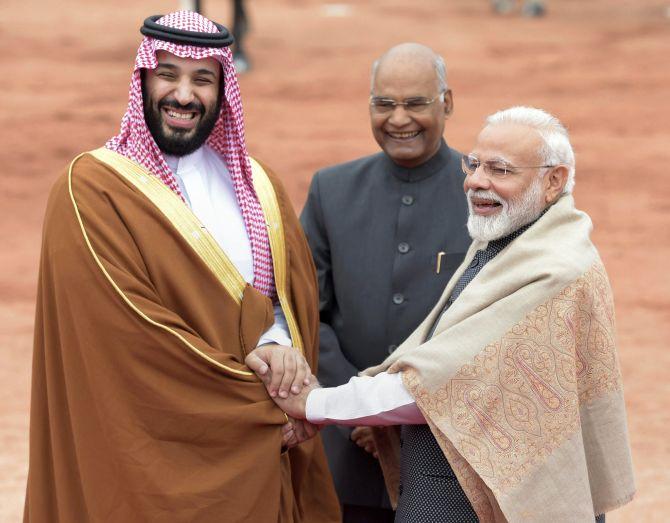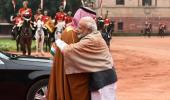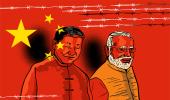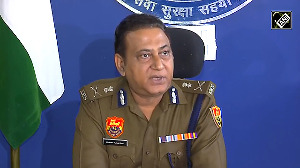'No matter what Modi may boast about 'new India', the geopolitical reality is that India's stature diminishes when it needs a small country like Saudi Arabia under an autocratic ruler to help out with what is arguably one of the most critical templates of its diplomacy,' says Ambassador M K Bhadrakumar.

Saudi Arabia is pushing forward as mediator between India and Pakistan with a messianic zeal that patently enjoys US backing.
Saudi Minister of State for Foreign Affairs Adel Al-Jubeir arrives in Delhi on Sunday. He was to have visited Islamabad on Friday, but rescheduled his plan so that he can touch base with Modi first and thereafter meet the Pakistani leaders, including army chief General Qamar Bajwa.
Modi and Bajwa will be Adel's key interlocutors. How far the Saudi waltz will advance remains to be seen. How Modi handles the piquant situation will bear watch.
Certainly, the Saudi mediation makes India look rather immature and that becomes willy-nilly a reflection of Modi's foreign policy legacy.
The point is, no matter what Modi may boast about 'new India', the geopolitical reality is that India's stature diminishes when it needs a small country like Saudi Arabia under an autocratic ruler to help out with what is arguably one of the most critical templates of its diplomacy.
Saudi Arabia has no track record as a peacemaker. On the contrary, it has a notorious reputation the world over as a promoter of terrorist groups.
Meanwhile, India does not have to be beholden to the Saudis to ease its tensions with Pakistan. The indications are that Russia and China are jointly sponsoring an initiative in this regard.
China is deputing a special envoy to visit India and Pakistan to discuss the crisis situation. Pakistani Foreign Minister Shah Mahmood Qureshi disclosed this in Islamabad.
To be sure, Russia and China, which actively coordinate on the foreign policy front, are in consultation each other on the India-Pakistan tensions.
We may also factor in that the foreign ministers of Russia and China had an opportunity last Wednesday to meet External Affairs Minister Sushma Swaraj at the RIC ministerial.
Following that, Chinese State Councilor and Foreign Minister Wang Yi also briefed Qureshi in a phone conversation where the latter had expressed the hope that 'the Chinese side will continue to play a constructive role in easing the current tension.'
Equally, at the height of the India-Pakistan crisis, on February 27, the Russian foreign ministry also had issued a statement expressing 'grave concern over the escalating situation along the Line of Control and the surge in tensions' between India and Pakistan 'which are Russia's friends.'
It took a neutral stance and called on both sides 'to show restraint and redouble efforts to resolve existing problems by political and diplomatic means.'
It is entirely conceivable that the Chinese special envoy's visit is a related development signifying a coordinated effort by Beijing and Moscow and in consultation with Islamabad and New Delhi.
This is, of course, a major shift in the tectonic plates of Eurasian politics and it has an added significance insofar as it is taking place in the New Cold War conditions.
Indeed, it does not need much ingenuity to figure out that a US-sponsored Saudi mediation between India and Pakistan must be a worrisome development for both Russia and China, from the geopolitical perspective.
At any rate, on Thursday, President Vladimir Putin telephoned Modi,/strong>. According to the Kremlin readout, they discussed the 'crisis in relations between India and Pakistan' and the Russian leader 'expressed hope for a prompt settlement.'
The careful wording hinted that Putin offered to lend a helping hand, jointly with China, to ease the tension.
Curiously, the very next day, Russian Foreign Minister Sergey Lavrov telephoned Qureshi in Islamabad -- presumably to follow up on the Putin-Modi conversation -- and offered help to 'de-escalate' the tensions.
The Russian foreign ministry readout, cited by the State news agency TASS, says: 'Moscow expressed its readiness to contribute to de-escalating tensions and that there is no alternative to settling all differences between Islamabad and New Delhi by political and diplomatic means.'
Importantly, Lavrov also outlined to Qureshi how the de-escalation process can be achieved -- via the mechanism of the Regional Anti-Terrorist Structure of the Shanghai Cooperation Organisation.
A Xinhua report since highlighted this aspect -- that Lavrov told Qureshi about the 'possibility of using the Shanghai Cooperation Organisation's Regional Anti-terrorist Structure for this purpose.'
Alongside, Russian Foreign Ministry spokesperson Maria Zakharova outlined in an important statement on Thursday Moscow's broad approach. Zakharova said:
'We are worried about the escalation of tension in relations between India and Pakistan and dangerous manoeuvres of both States' armed forces along the Line of Control that are fraught with a direct military clash.'
'We are urging the sides to display maximum restraint. We continue to assume that contentious matters should be resolved by political-diplomatic methods on a bilateral basis in line with the provisions of the 1972 Simla Agreement and the 1999 Lahore Declaration.'
'We reaffirm our readiness to provide all-out support to the Indian and Pakistani efforts in countering terrorism.'
From the Indian perspective, this adds up to an extremely positive outcome of the EAM's consultations in Zhejiang with her Russian and Chinese counterparts. This must be EAM Swaraj's finest hour in international diplomacy, as the curtain begins descending shortly on her scintillating stint as India's foreign minister.
No doubt, the urgency of 'de-escalation' of the tensions with Pakistan is self-evident.
The 'de-escalation' is far from over with the Indian pilot's return. In fact, the tensions on the Line of Control can spiral out of control anytime in the present surcharged atmosphere.
Without doubt, the international community -- read the US and NATO allies -- is closely watching. The Afghan endgame is at a most sensitive stage and any eruption of tensions between India and Pakistan will negatively impact the peace process.
India should wholeheartedly welcome the Sino-Russian proposal, cast within an SCO framework as far more preferable to the dalliance with the Saudis and the Emiratis -- or, for that matter, any UN intervention.
The fact of the matter is that both Russia and China are stakeholders in India-Pakistan normalisation and neither has any hidden agenda in this regard.
Of course, Russia and China are like-minded partners for India in the fight against terrorism. On the other hand, unlike in the Cold War era, Pakistan is keen on Eurasian integration, too.











 © 2025
© 2025